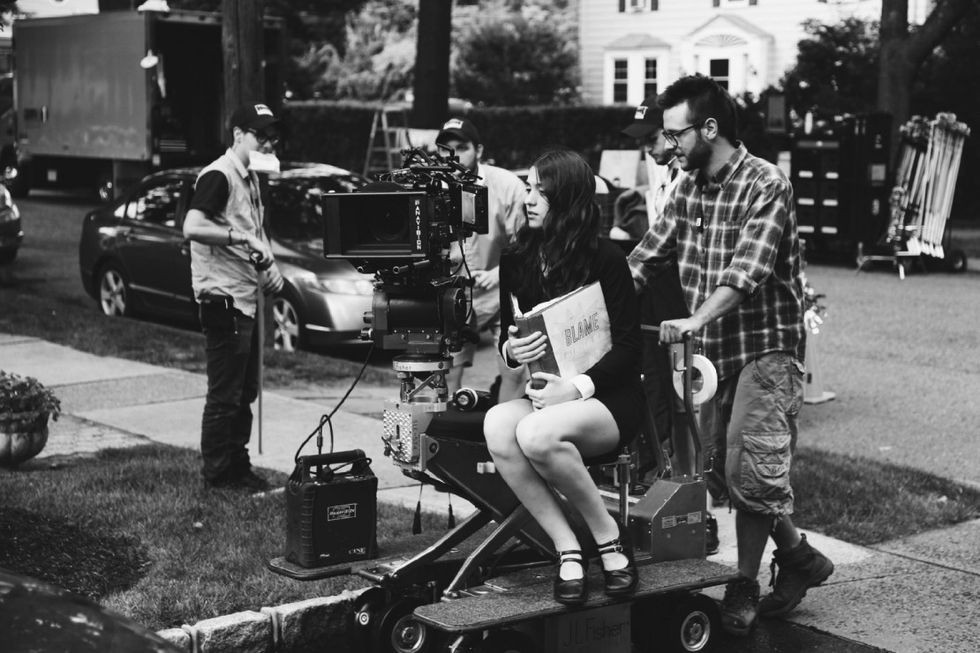'Blame': How a 20-Year-Old Made the Hottest Film at Tribeca Instead of Going to Film School
Quinn Shephard shares the secrets behind her self-taught journey from high school student to rising film star.
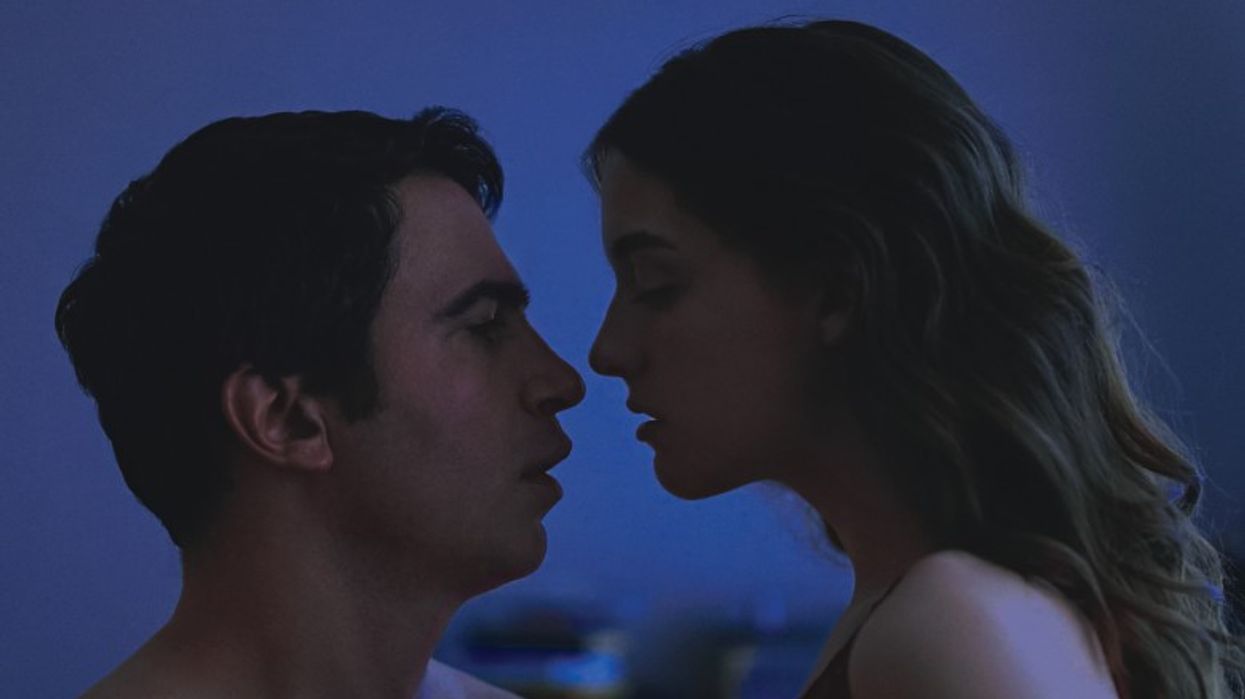
Quinn Shephard doesn’t like the classroom. She says she’s more of a hands-on learner. That’s why, at just 15, she decided to start writing her first feature film as a high school student in New Jersey. Instead of film school, she opted to spend her would-be college years producing, directing, editing and starring in Blame. Now, seven years later, the film has made its premiere at the Tribeca Film Festival, winning a Best Actress award for co-star Nadia Alexander.
Blame is a dark psychological teen drama about two rivals competing for the role of Abigail in their drama class performance of The Crucible—the popular girl versus the outcast. As the drama teacher (Chris Messina) starts to take sides, and vicious rumors spread throughout the school, themes from classic text begin to seep into their lives. Though teenage deceit is a tale as old as time, Shephard brings a fresh and emotionally raw perspective to the film.
"I was a good student, I just really don't like being in a classroom. That's not how I work."
No Film School sat down with Quinn Shephard and her producing partner (and mom) Laurie Shephard, to talk about the film. They told us about how they cracked the Hollywood code and learned it all themselves, and how almost everything that could’ve gone wrong did.
No Film School: I want to start the beginning. The film industry feels like such a rigid path sometimes—you have to go to film school, you have to do these internships, you have to meet the right people—and I'm wondering, was there a moment or an experience that you felt gave you permission to deviate from that set path?
Quinn Shephard: It definitely helped that my parents, especially my mom, were not judgmental at all of my decision to not go to school. I was a good student, I just really don't like being in a classroom. That's not how I work. From the time that I was really young and I started taking film classes, as a part of a pull-out program from middle school to high school, my least favorite part of the whole process was the first day, because on the first day you had to do like a six-hour seminar on technology. And I was always like, I want to go, I want to write the script, I want to be on set, I just want to do it. I was always like that, very hands on, and I just taught myself how to do things.
I always knew that I was moving very fast as an artist. I started working on my film when I was fifteen. I knew I wanted it to be my first feature, and I was acting, and I just I wanted to get out of high school as fast as I could. I graduated a year early and I just felt very eager to jump in. It was definitely a trial-by-fire learning process doing the film together. It was like we both went to grad school for film. But it just it very much felt like a natural way for me to work; to just teach myself as I went, and to use the knowledge that I had from being on sets as an actor, and combine that with my gut instincts.
"We read a lot of books. My mom read Producer to Producer like ten times."
NFS: Were there resources or people that you leaned on as teachers and mentors? Obviously, your mother would be one.
Quinn Shephard: Honest to god, really not outside of the two of us did we have any help.
Laurie Shephard: We did have the fact that you were in the business as an actress.
Quinn Shephard: Yes, that was the biggest help. Occasionally we would meet people who helped us out for a month here and there, doing emails, helping us out with some questions. We read a lot of books. My mom read Producer to Producer like ten times.
NFS: Did you do anything to emotionally you prepare yourself for the experience, maybe in the weeks before production?
Quinn Shephard: I wasn’t emotionally prepared. As a director, I was about as prepared as you could be. I spent two weeks with my DP mapping out all of the shots from the film, and I had look books that I had assembled over the course of years. My DP had been attached for years, and we had been discussing and shaping this vision for so long that I knew exactly what I wanted with the film. But I don’t think I was emotionally prepared for it, I was kind of a mess during the shoot. It was a very, very challenging process. Shooting your first feature, working six day weeks—one day we worked a seven a week when Chris was there—it's just brutal. If anything, I was so emotionally raw that it was able to come through in my performance as Abigail. It wasn’t very hard for me to cry because I was so high-strung, if I'm being honest.
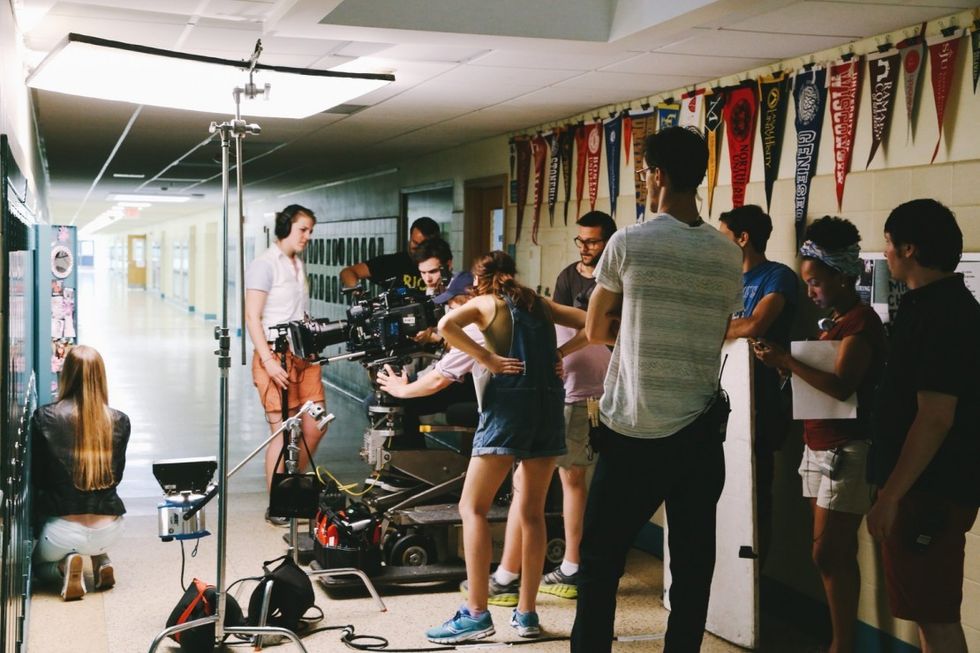
NFS: Was the choice to play Abigail due to limitations in casting or was it more of a creative director’s choice?
Quinn Shephard: I'd always intended to play Abigail and then there was a short period of time where I considered not doing it…
Laurie Shephard: And I said she had to. She just had to. Because this was really her story. Quinn was Abigail in high school, I mean it felt like it…
Quinn Shephard: Not quite as strange, but almost.
Laurie Shephard: So for a little while, she was kind of saying I don't know if I can do this, and I said you have to, there is just nobody else that could play Abigail.
Quinn Shephard: It definitely came from more of a place of us wanting to be true to the story, and not necessarily from a place of wanting to make a showcase for myself as an actor. We were always looking at what was best for the film. I don't think we felt that we would find another actor who necessarily got her in the exact same way that I did. And I'm very happy that I did it. Although, it definitely added a level of difficulty to the shoot that went beyond the scope of what I think we were prepared for, but the end result I'm very proud of.
"We had [Chris Messina] in mind for years and I'd written him basically a love letter convincing him why he was the only actor we wanted to play the role."
NFS: Did you encounter any struggles trying to get people to ‘buy in’ to the film and trust you, as such a young director? If so, what did you do to counter that and gain people’s trust?
Laurie Shephard: I think it was the passion. We were roping people in, but people wanted to be part it.
Quinn Shephard: And also when we got Chris [Messina]. We had him in mind for years and I'd written him basically a love letter convincing him why he was the only actor we wanted to play the role. And I think he said yes as a combination of really loving the script and liking a short film that I had sent him, but he was also probably charmed by how insane the task was that we were trying to accomplish.
NFS: Were there parts of the process that you just totally didn’t expect?
Quinn Shephard: The music. We spent about a year on the music. I had done shorts before and getting festival rights is a very different game from getting distribution rights for music. Almost all of the soundtrack for the film was original and I was there for the production of it. I found the artists and I sat in on every recording session, and every writing session, and obviously for the entire scoring process. It was not something that I considered would be that hard. I was like, ‘oh we'll find music and we’ll license music,’ but it's just not simple at all. It was so mind-blowingly difficult and complicated to the point that we are still working on finalizing things. That was definitely the part that I was like, okay, next time I can just have the creative aspect of this, and have someone else handle the legal aspect.
Laurie Shephard: And things take a while. We had to get The Crucible and The Glass Menagerie rights and luckily we started right away with that. The Glass Menagerie took years by the time we got the final signed contract.
Quinn Shephard: It was really all of the legal complications that I don’t think either of us was expecting to be quite so difficult. I mean, a lot of things were difficult. We had about everything that can possibly go wrong on a set go wrong.
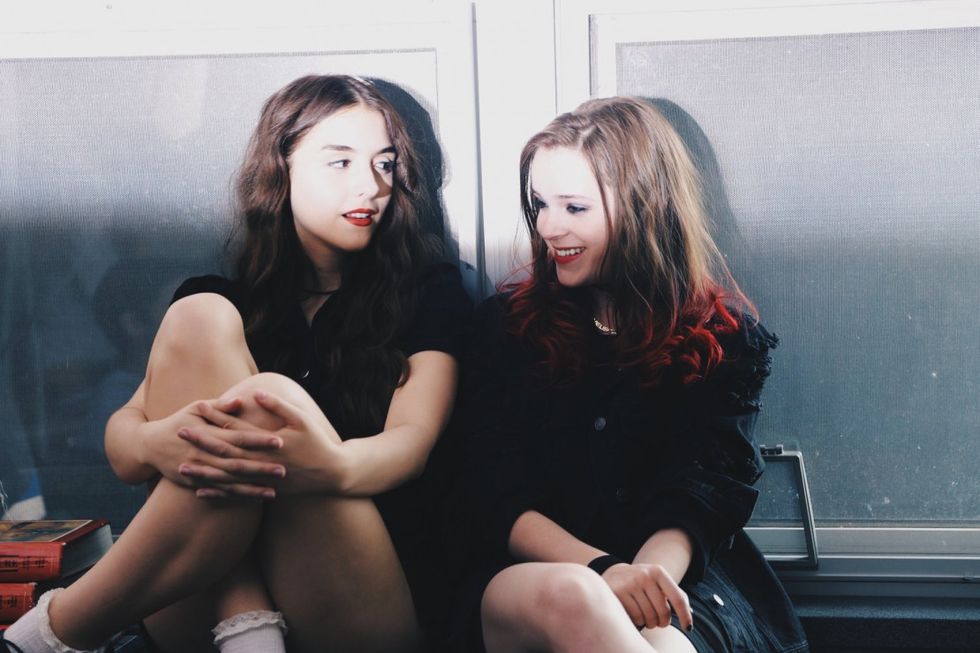
NFS: What was the biggest thing that went wrong?
Quinn Shephard: Well, here’s something that didn’t necessarily go wrong but that was a big challenge: We only had seven days with Chris Messina because of his schedule. So we shot for seven days straight, which was quite a challenge for us as well as the crew. For a lot of the classroom scenes, we shot his coverage separately from the coverage of some of the other students because we didn't have time to shoot all the different angles while he was there. So we had to then go and do almost a whole week of pickups in the classroom after we finished shooting him, and get all of the continuity back to where it was. People were going back through old footage to figure out where everyone’s pens were on the desks. But everyone was real troopers about it. I tried to never do faked coverage of any dialogue between actors, so for all of the banter that you see between the kids in the back of the room, Eric and T.J. and Chris at the front, we were actually shooting two cameras at a time.
I had a highlighter and, during lunch, I would go through every single sentence of the script, and I would have the dailies up on the computer next to me, and I was watching and highlighting everything we had covered.
NFS: What was the dynamic like working as a mother-daughter duo?
Quinn Shephard: [laughs] I mean it was mostly positive.
Laurie Shephard: Yes.
Quinn Shephard: My advice, as wonderful as it is that we did this together, I also think it's incredibly hard to produce with someone you love because you underestimate how much it's going to completely take over your relationship.
"It's incredibly hard to produce with someone you love because you underestimate how much it's going to completely take over your relationship."
Laurie Shephard: I think the thing that happened was sometimes it would be like, I have to put on my mom hat here not my producer hat, and when you’re doing something that almost seems impossible, you don’t have a lot of time. Sometimes it’s all business and meanwhile, she's my daughter who I love more than anything and maybe she needs a hug right now, and maybe we need to not talk about the budget right now, so I think that that was trying to find a balance. The writing and the editing were great.
Quinn Shephard: Yes, that was a beautiful experience. The production was a lot. That’s what I think, it’s a beautiful experience to creatively collaborate with someone you love, but it’s a very challenging experience to produce with someone you love. Because it's so stressful and there's no escape from it, when the person you want to escape with is also the person you’re working with.
When you’re doing a film by yourself with one other person, it just becomes the only relationship that you have in your life. There's nothing else. Making this, I definitely learned about the sacrifices of the rest of your life. You just sort of realize at some point, oh my god I haven't seen my best friend in seven months.
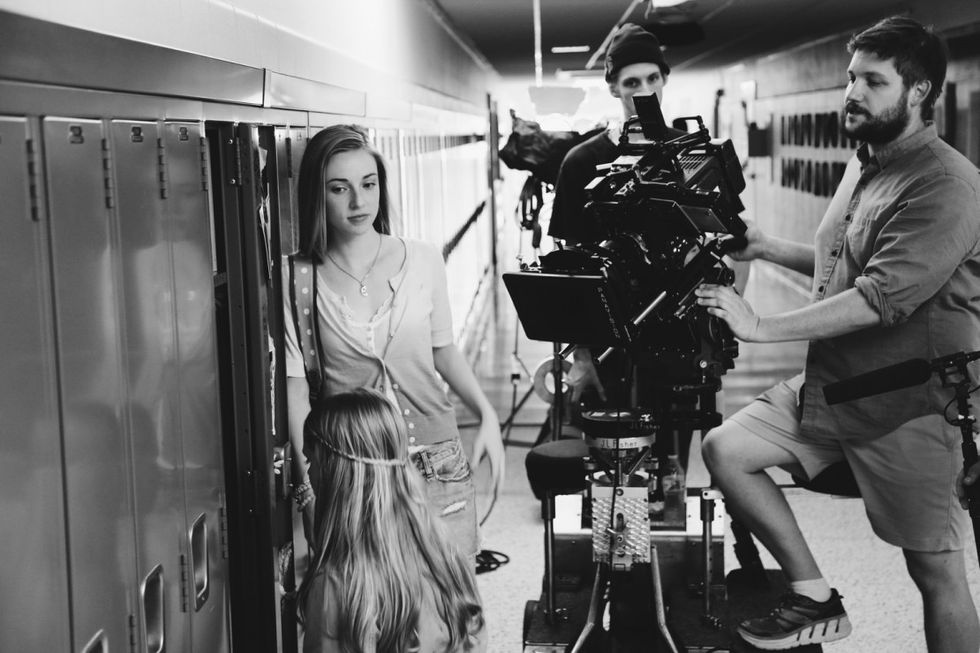
NFS: One of the things that I find particularly impressive is that you found yourself working with such seasoned actors, like Messina. What did you do to prepare for that kind of relationship? Were you intimidated?
Quinn Shephard: Yeah, I was nervous but we also established a kind of rapport. Chris and I used to talk on the phone for about three hours every week for a few months leading up to the shoot—like three hours at a time. Chris is very opinionated as an actor, and I'm a very opinionated director, but it actually worked quite well because he had a lot of respect for me. You know, you walk in and you're a little nervous because you’re like, this actor is giving us a gift by being here, how willing is he going to be to listen to my creative vision versus go after his own? But I think we found a balance. He gave me a lot of input on Jeremy, and we did a lot of rewrites together before the shoot. I think in the end he’s just a joy to work with, and never showed any doubt for me even though I was so young.
NFS: So how did the film end up at Tribeca?
Quinn Shephard: It's not that crazy of a story. We submitted it to a few festivals, we were invited to a few festivals, and Tribeca was the one that we really wanted to go with.
Laurie Shephard: SXSW called and asked if we’d heard from Tribeca yet, but they had a later time, so they gave us 24 hours to get a decision and when Tribeca said yes we were very excited.
NFS: Do you have any advice for any emerging filmmakers might be thinking about going down the same path?
Quinn Shephard: I have emotional advice and practical advice. My practical advice is that they better really love the film that they're about to make. I loved Blame like weirdly so much, and I think if I didn’t, there would have been a point where I gave up. I loved it so much, and I felt it was so important for me to tell this story, that it drove me and drove us through every obstacle. Your film has to be something that you would ride or die for. And artistically, my advice is to just trust your gut, and trust your instincts, to not be precious about your work at all. Always listen to constructive criticism and always be open to changes, but to not just do what you think people want you to make, but to make something that feels true to you.
NFS: These things that you’ve mentioned, you know trusting your gut, gaining the respect of actors, it all sort of comes down to confidence and I think at a young age, it's really hard to have that kind of confidence. You just made a movie that is in part about how much high school sucks, you know this. Do you have any advice for people who don’t naturally have that kind of confidence?
Quinn Shephard: For me, starting on the journey, it was terrifying. I was really young and so vulnerable, and writing about topics that were really embarrassing to show people when I was so young. It was quite a challenge. But I think, at the end of the day, I pushed myself as hard as I possibly could to face my fears and to seek the truth, even if it was really embarrassing and scary. I was constantly saying to myself, if you're not honest in your work, it's not going to be valuable. So do the thing that terrifies you, just keep doing the thing that terrifies you, jump off the high dive. Obviously, it's not easy. I think you have to listen to the people in your life who are rooting you on, like my mom was, and try as hard as you can to shut out the people who are not. Because what's the worst that’s going to happen? You fail? But at least you tried.
Blame is currently playing in limited theatrical release.
For more, see our complete coverage of the 2017 Tribeca Film Festival.
